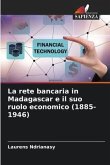From the time of the French protectorate in 1885 until the creation of a bank of issue in 1925, Madagascar's banking and monetary system was totally controlled by merchant banks. During this period, a banking network formed by the first bank in Madagascar, the Comptoir National d'Escompte de Paris, was established. In response to the French government's appeal, the Parisian bank had lent its support to Madagascar's colonial project and thus became an essential element in the realization of the colony's development project. The period of the First World War, however, revealed the limits of the colony's banking and monetary system because of the cut-off of communications with the metropolis. The monetary constraints caused by the war and the acuteness of the problem of agricultural credit in the colony revived the long-standing project of a bank of issue. The creation of the Banque de Madagascar in 1925 made it possible to implement a new financial policy in terms of monetary circulation and credit distribution. The Bank of Issue thus contributed to the economic development of the colony.








